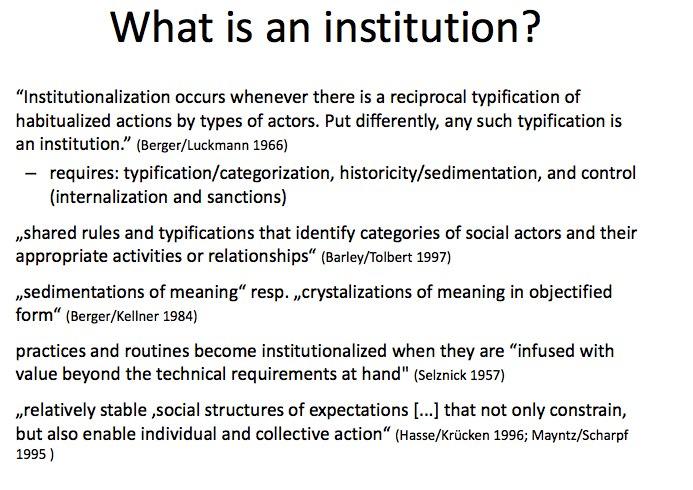Some things are experienced immediately. We know right away what we're looking at, what we're dealing with. I'm not talking about moments of instant recognition, about which we could be mistaken. I'm talking about the comfortable way in which we know our way home through the park. The certainty that this is the park, which would be true even in a dream (a dream about the park). I'm talking about what it is like to be at home in the ordinary way.
I thought about this when Liam Stanley tweeted the following slide to explain "what, exactly, an institution is in political and social science":
These are all perfectly good definitions. But I've always thought we should define institutions in contrast to mediated forms of experience. If you have to ask what an action means, it is not "typical", i.e., it is not institutionalized.
I think specifically of Kant's definition of intuition as a model. Intuition is that through which knowledge of things is given to us immediately. The "that through which" is important because it actually suggests mediation (going through something). So intuition is the medium of immediate knowledge, almost a contradiction in terms.
But then, immediacy is probably an essentially paradoxical notion.
Anyway, institution is that through which the power of people is taken from them immediately. Or the way in which people are immediately taken with experience. Institution is the immediacy of people in experience. (What one definition refers to as the identification of "categories of social actors".) Institution is the immediacy of social experience.
Likewise, intuition is the immediacy of material experience. We experience the world as a collection of things because of intuition. We experience history as a collective of people because of institution.
_________
Update (02-10-2016): Reading this just now it occurred to me that intuition/institution is that through which knowledge/power is distributed in experience immediately. It is the immediacy of sense and motive in experience. That is, institutions don't just take power from people. It is also the medium in which they, immediately, have certain powers. Likewise, intuitions don't just reveal things immediately in any give situation, they also conceal things.

1 comment:
How does this relate to the idea that "life is elsewhere"? When people see "the real world" as being somewhere else than where they are, they have identified the boundary of the institution they are in. Is the institution that which disables intuition?
Post a Comment